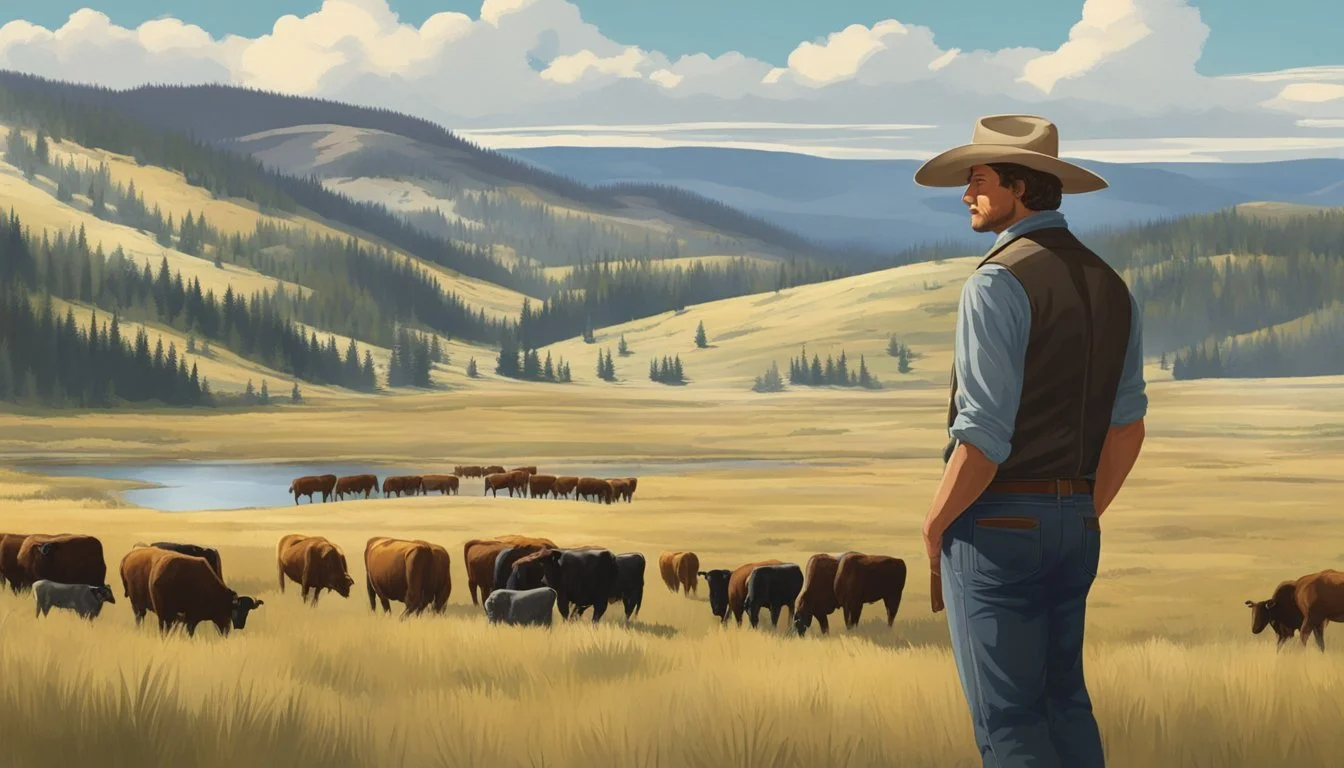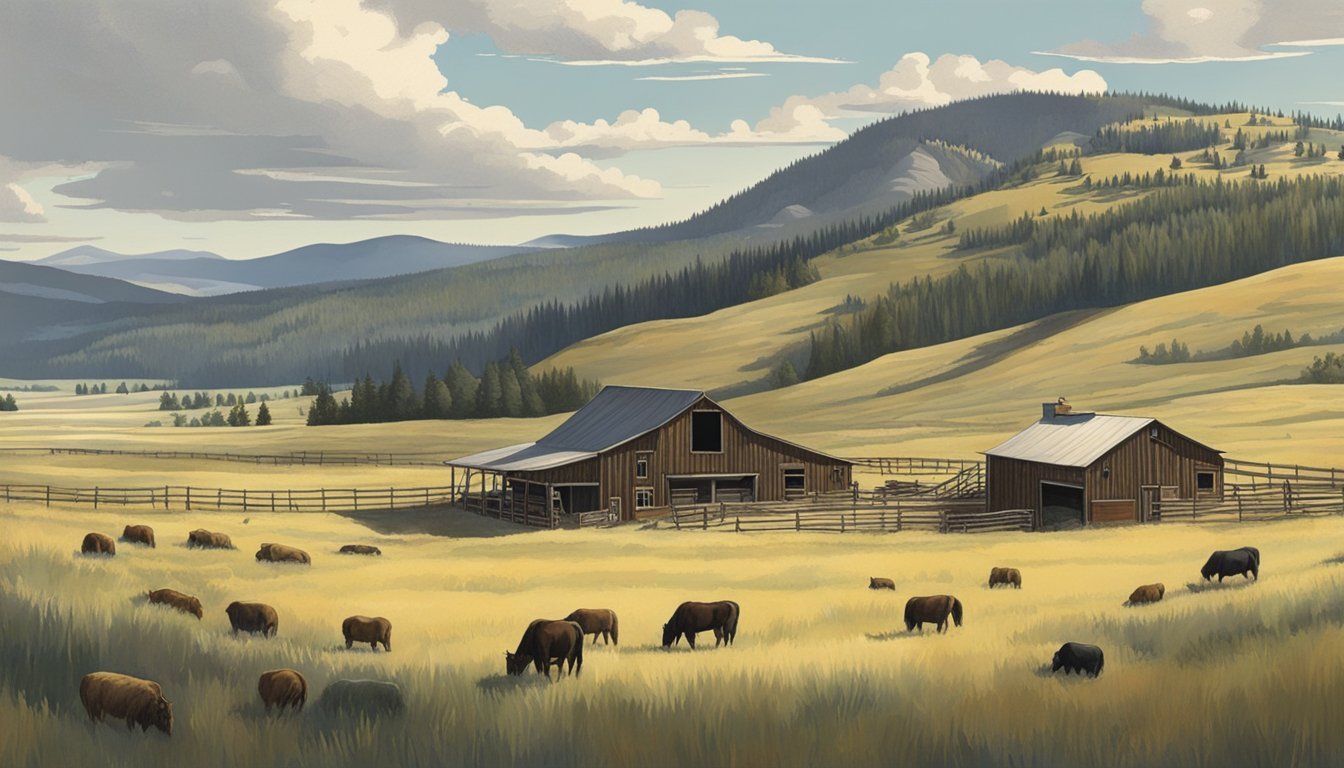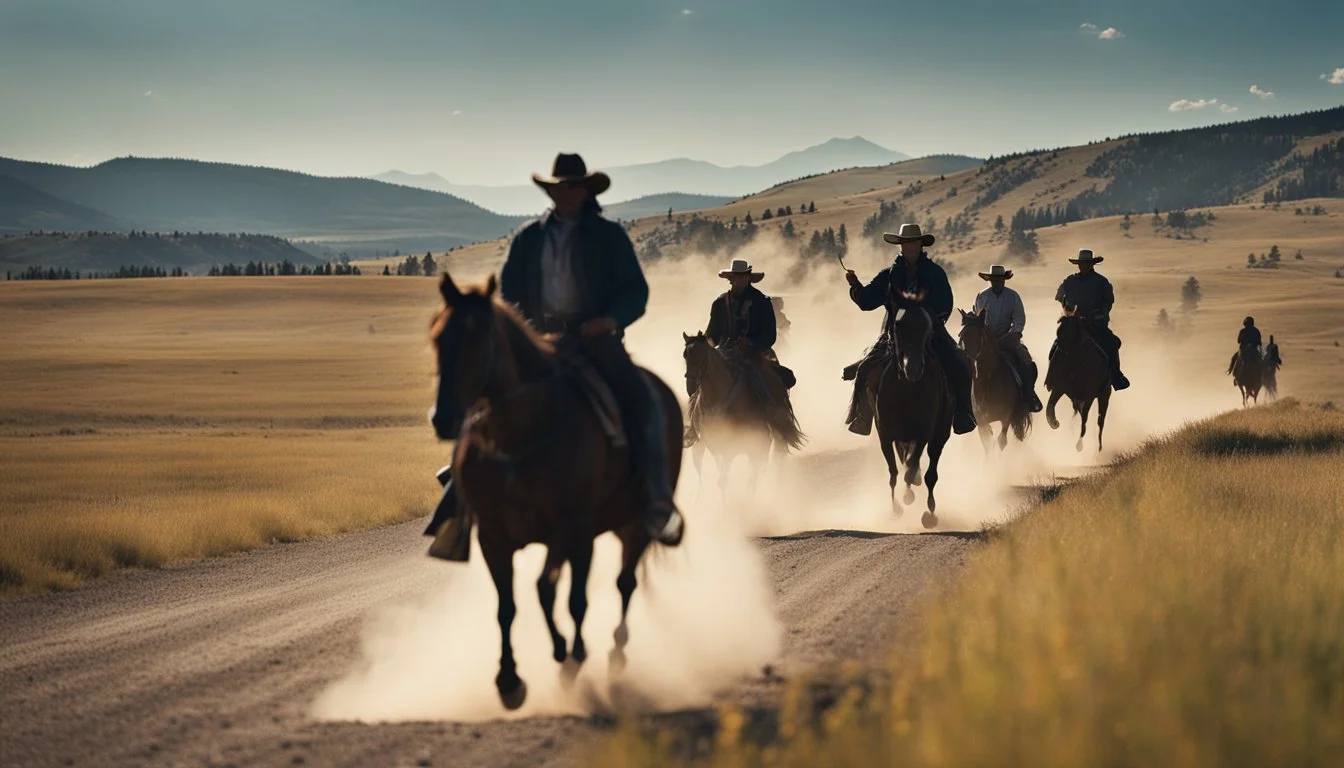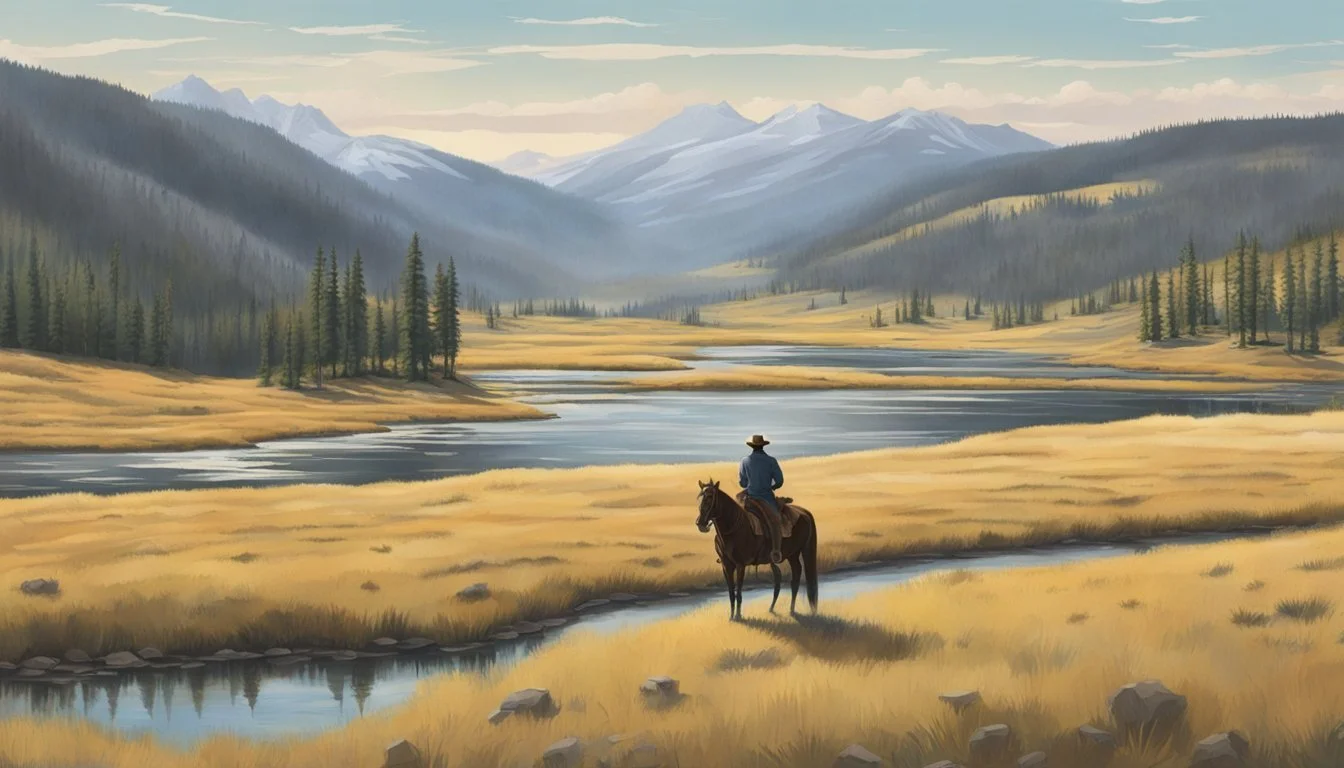Tate's Shocking Inheritance Could Rewrite Yellowstone's Dutton Legacy Forever
Yellowstone's Dutton Ranch has been at the center of intense family drama and power struggles throughout the series. As the show progresses, fans speculate about who might ultimately inherit this vast and coveted piece of land. While John Dutton's children have been the obvious contenders, an intriguing possibility emerges: What if Tate, John's grandson, were to inherit the ranch instead of his father Kayce?
Tate inheriting the Yellowstone Ranch could potentially bring a fresh perspective and new direction to the Dutton legacy. As a member of the seventh generation, Tate represents both the future of the family and a bridge between the Dutton and Native American heritage through his mother Monica. This unique position could allow him to navigate the complex relationships and conflicts that have long plagued the ranch and its surroundings.
The possibility of Tate taking over the ranch raises interesting questions about the future of the Yellowstone. Would he continue the Dutton tradition of fiercely protecting the land, or might he be more open to compromise and change? How would his mixed heritage influence his decisions and relationships with other characters? These potential storylines could breathe new life into the series and explore themes of legacy, identity, and the evolution of the American West.
Historical Context of the Dutton Family Legacy
The Dutton family's legacy spans generations, intertwining with the evolution of the American West. Their story began in the late 19th century and continues to shape the fictional world of Yellowstone.
Beginnings: from 1883 to Yellowstone
James Dutton, a Civil War veteran, led his family westward in 1883. He established the foundation of what would become the Yellowstone Ranch in Montana. This journey, fraught with hardships, mirrored the experiences of many settlers during the era of westward expansion.
The Duttons faced numerous challenges as they built their homestead. They contended with harsh winters, conflicts with indigenous peoples, and the unforgiving landscape. Despite these obstacles, James and his wife Margaret persevered, laying the groundwork for their family's future.
As the years passed, the Dutton ranch grew in size and influence. Each generation added to its legacy, expanding their holdings and cementing their position as a powerful force in Montana.
Generational Shifts and the 1883 Prophecy
The Dutton family's story is marked by significant generational shifts. Each new leader of the ranch faced unique challenges, from economic pressures to changing societal norms.
A key element in the family's lore is the "1883 Prophecy." This prediction, made during the family's initial journey, foretold seven generations of Dutton rule over the land. This prophecy has shaped the family's decisions and motivations throughout their history.
The weight of this legacy has influenced each generation differently. Some embraced the responsibility, while others struggled under its burden. This dynamic has created complex relationships within the family, driving much of the drama in the Yellowstone series.
Character Profiles and Dynamics
The Dutton family's complex relationships and individual personalities shape the potential future of the Yellowstone ranch. Tate's unique position as the young heir intertwines with his grandfather John's influential presence and the dynamics between his aunts and uncles.
Tate: The Young Heir
Tate Dutton stands at the crossroads of two worlds - the Yellowstone ranch and his Native American heritage. As John Dutton's grandson, he's positioned to inherit the largest ranch in the country. Tate's character has evolved from an innocent child to a young man exposed to the harsh realities of ranch life.
His mixed heritage offers a unique perspective that could reshape the Dutton legacy. Tate's close relationships with both his father Kayce and grandfather John have given him insight into the family's history and the responsibilities of running the ranch.
The challenges Tate has faced, including traumatic experiences, have accelerated his growth and maturity. His potential as heir hints at a future where traditional ranch values might merge with a more inclusive worldview.
John Dutton's Influence and Role
John Dutton's relationship with Tate is pivotal in shaping the ranch's future. As the family patriarch, John sees Tate as the key to preserving the Dutton legacy. He's taken an active role in grooming Tate for leadership, sharing knowledge about ranch operations and family history.
John's influence extends beyond practical teachings. He instills in Tate a deep sense of duty to the land and the Dutton name. This mentorship creates a strong bond between grandfather and grandson, potentially bypassing Tate's father Kayce in the line of succession.
Despite his tough exterior, John shows a softer side with Tate. This relationship provides insight into John's hopes for the ranch's future and his desire to secure its legacy through the youngest Dutton.
Sibling Relationships: Beth, Kayce, and Jamie
The dynamics between Beth, Kayce, and Jamie significantly impact Tate's potential inheritance. Beth's fierce protectiveness of the ranch aligns with John's wishes, potentially making her a strong ally for Tate. Her business acumen could prove valuable in mentoring Tate on the ranch's financial aspects.
Kayce, as Tate's father, plays a crucial role in bridging the gap between Tate's dual heritage. His own conflicted relationship with ranch life might influence Tate's future decisions. Jamie's complex standing within the family adds another layer of uncertainty to the succession plan.
The siblings' interactions with Tate and their individual ambitions for the ranch create a web of influences that will shape his development as a potential heir.
The Scenario of Tate Inheriting the Ranch
Tate's inheritance of the Yellowstone Ranch would significantly alter the Dutton family dynamics and the future of their vast property. This scenario raises questions about control, ownership, and shifting power structures within the family.
Implications for Control and Ownership
If Tate inherits the Yellowstone Ranch, it would mark a generational shift in ownership. As John Dutton's grandson, Tate represents the seventh generation of Duttons to potentially control the property. This transition could ensure the ranch stays within the family for years to come.
Given Tate's young age, a trust or guardianship might be established to manage the ranch until he reaches adulthood. Beth Dutton, as Tate's aunt, could play a crucial role in overseeing the property during this period.
The inheritance might also impact ongoing land disputes and business dealings. Tate's ownership could potentially reset negotiations with outside parties interested in the ranch.
Changes in Family Dynamics and Power
Tate inheriting the ranch would reshape family relationships. His father, Kayce, might take on a more prominent role in ranch operations to support his son. This shift could create tension with other family members who previously held more influence.
Beth's position within the family might change significantly. As Tate's aunt and potential guardian, she could wield considerable power over ranch decisions.
The inheritance might also affect Tate's relationships with his cousins and other relatives. It could potentially create rifts or alliances as family members adjust to the new power structure.
Tate's newfound responsibility could accelerate his maturation and influence his personal development, shaping his future decisions about the ranch's management and preservation.
Yellowstone Series Interpretations
The Yellowstone series has sparked numerous fan theories and interpretations. Taylor Sheridan's intricate storytelling has left viewers speculating about the show's ultimate direction and potential endings.
Narrative Theories and Speculation
Fans have developed intriguing theories about Yellowstone's future. One popular idea suggests Tate Dutton might inherit the ranch, fulfilling a prophecy from the 1883 prequel series. This theory ties into Kayce's vision and the concept of the seventh generation inheriting the land.
Some viewers believe the Yellowstone Dutton Ranch may cease to exist by the series finale. Others speculate about potential threats to Tate's inheritance, including attacks on the ranch targeting him specifically.
The show's complex family dynamics and power struggles have led to various predictions about character fates and alliances.
Taylor Sheridan's Vision and Storytelling
Taylor Sheridan's approach to Yellowstone has captivated audiences with its blend of modern Western themes and family drama. His storytelling often incorporates generational conflicts, land disputes, and the preservation of a way of life.
Sheridan's writing leaves room for interpretation, allowing viewers to form their own theories about the series' trajectory. His character development and plot twists keep fans guessing about potential outcomes for the Dutton family and their ranch.
As Yellowstone approaches its conclusion, speculation intensifies about how Sheridan will bring the story to a close. Fans eagerly anticipate how he will resolve the various storylines and conflicts established throughout the series.
Impact on Tribal Relations
Tate's inheritance of the Yellowstone ranch would significantly alter relations between the Dutton family and the Broken Rock Reservation. His mixed heritage positions him uniquely to bridge divides and potentially reshape longstanding conflicts over land and resources.
Broken Rock and Yellowstone: An Evolving Relationship
Tate's dual identity as both a Dutton and a member of the Broken Rock tribe could foster improved communication between the two groups. His leadership might prioritize mutually beneficial partnerships and shared resource management. This shift could ease tensions over land rights and water access that have long plagued relations.
Tate may seek counsel from tribal elders like Spotted Eagle, incorporating traditional knowledge into ranch operations. His approach could blend modern ranching practices with Indigenous land stewardship principles. This integration might set a new precedent for cooperation between ranchers and Native communities in the region.
Representing Native American Perspectives
As a Native American ranch owner, Tate would bring vital Indigenous perspectives to local and state-level discussions on land use and conservation. His position could amplify tribal voices in policy decisions affecting ancestral territories. Tate might work closely with leaders like Thomas Rainwater to advocate for Native rights and cultural preservation.
Tate's leadership could challenge stereotypes and showcase Native American success in agriculture and business. His role might inspire increased Native representation in Montana's ranching industry. By honoring both his Dutton legacy and tribal heritage, Tate could become a symbol of reconciliation and progress in tribal relations.
Imagining Yellowstone's Future
Tate inheriting the Yellowstone ranch opens up intriguing possibilities for the show's future direction and potential spin-offs. This scenario could explore themes of legacy, cultural identity, and the evolution of ranching in the modern era.
Potential Storylines and Spin-offs
A Tate-centric storyline could focus on his journey balancing his Dutton heritage with his Native American roots. This unique perspective might lead to a spin-off series exploring the ranch's transition under his leadership. The show could delve into Tate's efforts to modernize ranching practices while preserving traditions.
Potential conflicts could arise from:
Tate's inexperience in ranch management
Resistance from long-time ranch hands
External pressures from developers or environmental groups
A spin-off might also explore Tate's relationships with other young characters like Carter, potentially forming a new generation of ranchers.
The Legacy of the Seventh Generation
Tate's position as the seventh generation Dutton carries significant weight in the Yellowstone universe. This storyline could explore:
The fulfillment of Native American prophecies
Tate's efforts to honor both his Dutton and Native American heritage
Challenges in bridging two distinct cultures
The show might depict Tate implementing sustainable ranching practices that align with traditional Native American land stewardship. This could create tension with older ranch hands resistant to change.
Tate's leadership could also lead to storylines about:
Land disputes with neighboring tribes
Partnerships with Native American businesses
Educational initiatives on the ranch
Contemporary Culture and the Ranch
Yellowstone has sparked renewed interest in ranch life and Western culture. The show explores how traditional values intersect with modern realities on sprawling cattle operations like the fictional Dutton Ranch.
Cultural Impact of Yellowstone and Its Commentary
Yellowstone's portrayal of ranch life has captivated audiences nationwide. The series showcases the challenges faced by modern cowboys as they balance tradition with technological advancements.
Ranch hands are depicted using smartphones and GPS alongside traditional horsemanship skills. This juxtaposition highlights the evolution of ranching practices in the 21st century.
The show's popularity has led to increased tourism in Montana, with fans eager to experience the rugged beauty of the American West firsthand.
The Modern West and the Duttons' Place Within It
The Dutton family represents a complex blend of old and new in the contemporary Western landscape. Their struggle to maintain their vast Montana ranch reflects real-world issues faced by landowners today.
Land development pressures, environmental concerns, and changing economic realities all feature prominently in the Duttons' story. These themes resonate with viewers and shed light on the challenges of preserving ranching traditions.
The series also explores the tension between Native American rights and ranching interests, adding depth to its cultural commentary. This nuanced approach has sparked discussions about land use and heritage in the modern West.
Political and Social Undercurrents
Tate Dutton's hypothetical inheritance of the Yellowstone ranch would dramatically alter Montana's political landscape. His youth and inexperience could create power vacuums, while external economic forces would continue to exert pressure on the ranch's future.
Special Elections and Dutton's Political Power
John Dutton's governorship would likely end prematurely if Tate inherited the ranch. A special election would be triggered, reshaping Montana's political dynamics. Tate's age would prevent him from directly wielding political influence like his grandfather. This power vacuum could lead to new alliances forming among Montana's elite.
The Dutton name still carries significant weight. Political operatives might try to curry favor with young Tate or his advisors. However, without John's savvy and connections, maintaining the ranch's political shield would prove challenging for Tate's guardians.
Economic Forces: Market Equities' Ambitions
Market Equities would likely view Tate's inheritance as an opportunity to renew their efforts to acquire Yellowstone land. The company's vast resources and long-term planning could overwhelm Tate's inexperienced management team.
Sarah Atwood might pivot her strategy, potentially offering partnerships or mentorship programs to gain Tate's trust. This softer approach could prove more effective than the aggressive tactics used against John.
Economic pressures on ranching would continue to mount. Tate's team would need to innovate quickly to keep the ranch profitable and resist Market Equities' advances. Land value disputes and development proposals would remain contentious issues.




